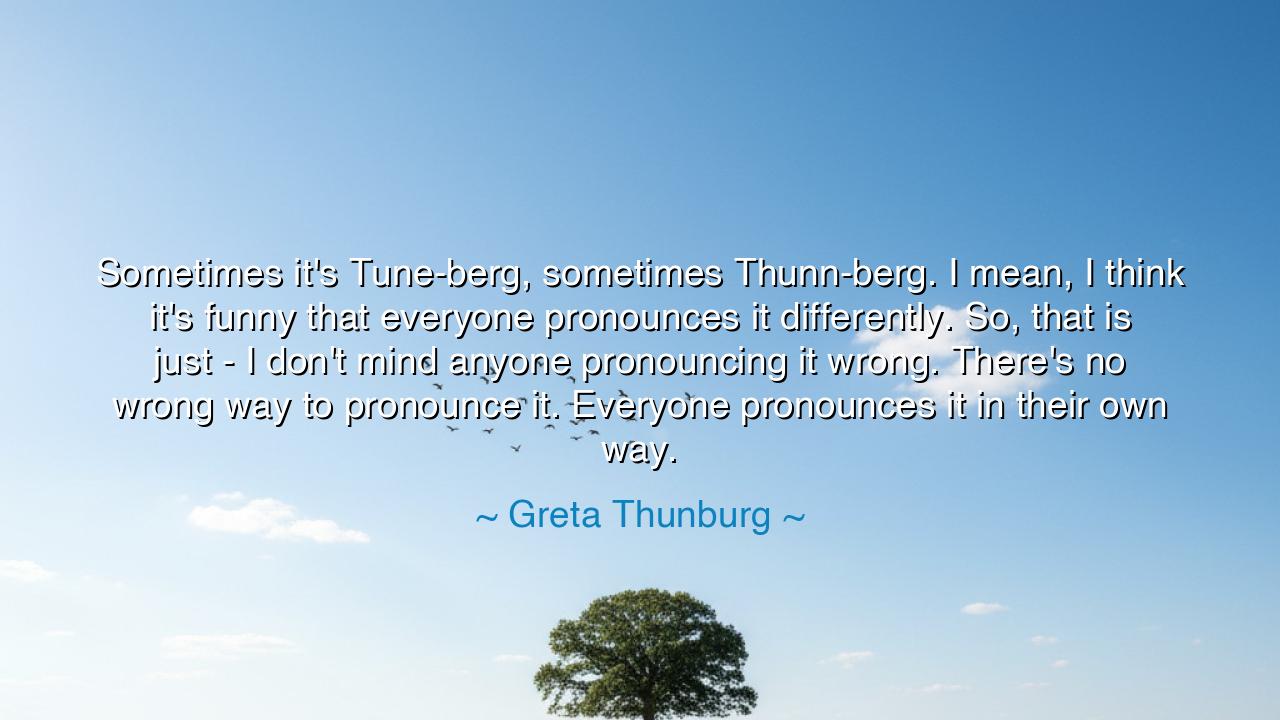
Sometimes it's Tune-berg, sometimes Thunn-berg. I mean, I think
Sometimes it's Tune-berg, sometimes Thunn-berg. I mean, I think it's funny that everyone pronounces it differently. So, that is just - I don't mind anyone pronouncing it wrong. There's no wrong way to pronounce it. Everyone pronounces it in their own way.






In the words of Greta Thunberg, “Sometimes it's Tune-berg, sometimes Thunn-berg. I mean, I think it's funny that everyone pronounces it differently. So, that is just—I don't mind anyone pronouncing it wrong. There's no wrong way to pronounce it. Everyone pronounces it in their own way.” What seems, at first glance, a simple observation about a name, carries within it the wisdom of one who understands the nature of identity and humility. In this brief and tender reflection, Greta reveals not only grace but a profound acceptance of the diversity of human perception. Her words whisper an ancient truth: that what matters is not how the world names us, but how steadfastly we live our truth.
Names, throughout history, have held sacred power. The ancients believed that to know a person’s true name was to touch the essence of their being. Yet Greta, in her youthful clarity, dissolves this rigidity. She reminds us that identity is not confined to pronunciation or perfection; it breathes through meaning, through action, through the impact we leave upon the earth and one another. Her calm acceptance of mispronunciation is no small thing—it is the wisdom of one who does not cling to ego. She stands not for how she is called, but for what she calls others to awaken to. Her name may change on the tongues of the world, but her purpose remains unshaken.
This humility is the mark of the truly great. For those who are centered in purpose do not seek to be understood in form, but in spirit. When Greta laughs at how her name shifts from voice to voice, she reflects the very rhythm of humanity—a thousand accents, a thousand songs, each carrying its own melody. She reminds us that unity does not mean sameness; it means harmony within difference. Her words are a living echo of the old truth spoken by Heraclitus: “The river that flows is never the same, and yet it is the same river.” So, too, are we ever-changing in the eyes of others, yet constant in our core.
Consider the story of Alexander the Great. Across lands and languages, his name was spoken in countless ways: Iskandar, Aliksandros, Eskendere, Skanderbeg. Yet the meaning of his legacy did not depend on the precision of syllables but on the reach of his vision. The name bent and shifted like wind through reeds, but the spirit behind it remained indomitable. So it is with Greta. The power of her name is not in how it is spoken, but in what it has come to represent: courage, youth, conscience, and the unyielding call to protect the living earth.
In truth, Greta’s acceptance of her name’s variations is an act of freedom. She frees herself from the vanity of control and from the fragile walls of identity built upon recognition. To live without needing to correct others, to find humor where others might find offense, is to walk with the ease of a wise soul. Such peace can only come from one who knows her purpose is larger than herself. She does not defend her name, because her life has already given it meaning. This is the essence of self-possession: to know oneself so deeply that no mispronunciation, no misunderstanding, can shake the foundation of who one is.
But there is also tenderness here—a vision of connection. Greta’s acceptance of difference mirrors the world she fights to protect: diverse, interwoven, imperfect yet beautiful. She sees in every mispronunciation not insult, but participation; not ignorance, but attempt. When she says “there’s no wrong way to pronounce it,” she is teaching a greater truth: that empathy is more important than accuracy, that it is the effort to understand, not the precision of understanding, that binds us together as humans.
So, let this be the lesson: do not cling too tightly to the form of your name, your role, or your image. Let the world say it as it will. What matters is not the sound, but the song behind it—the authenticity of your deeds, the sincerity of your heart. Be as Greta is: amused by the world’s variety, steady in purpose, free of the need to correct what does not harm. If your name is misheard, let your actions pronounce it rightly. If your essence is misunderstood, let your perseverance speak in its place.
Practical teaching: When others fail to see you clearly, do not rush to defend your reflection—simply continue to be light. Learn to laugh, as Greta does, at the small imperfections of the human tongue, for these are signs that people are trying to know you. Seek not perfect recognition, but genuine connection. For in the end, every voice that calls your name—however differently—adds to the music of your legacy. And it is better to be many things to many hearts, than one perfect sound lost in silence.






AAdministratorAdministrator
Welcome, honored guests. Please leave a comment, we will respond soon